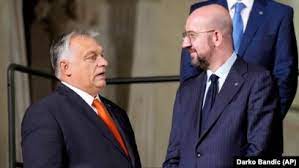EU’s Michel downplays criticism of his plan to resign early

Brussels: European Council president Charles Michel downplayed on Jan 7 criticism of his plan to resign early to run for a seat in the European Parliament, saying there was plenty of time to choose his successor and the European Union had options to “avoid Viktor Orban”.
Mr Michel, a former Belgian prime minister, announced on Jan 6 that he had decided to run in the EU’s parliamentary election in June. That would see him leave his role as chief of the European Council, the group of government leaders of the 27 EU member states, before his term expires at the end of November 2024.
As Hungary holds the rotating presidency of the council from July to December 2024, Hungarian Prime Minister Viktor Orban could end up leading meetings if an interim successor is needed. Mr Orban has opposed many EU initiatives to support Ukraine and has been widely criticised for undermining democratic rights in Hungary.
“I want to be clear that in any case, in June the decision was to be made on my successor and the Parliament decision will be in July so it’s easy for the council to decide, to anticipate for my successor to enter into function,” Mr Michel told a media call.
“There are many tools if there is the political will to avoid Viktor Orban.”
Mr Michel’s resignation comes at a critical moment for EU diplomacy as the bloc struggles to maintain momentum and support for Ukraine, handle a fracturing Middle East and disputes with China.
“Charles Michel’s decision to prematurely leave the EU Council presidency to pursue his own political career as MEP is not only self-centred but also irresponsible: it will pave the way for Viktor Orban, the then president of the rotating presidency of the council, to take over #EUCO until a new appointment,” law professor Alberto Alemanno of France’s HEC University said on social media platform X.
EU opposition to what it sees as Mr Orban’s undermining of democratic rights in Hungary prompted the bloc to freeze billions of euros in funding for Budapest. Some funds were unlocked in late 2023, but about €20 billion (S$29.1 billion) remains frozen.
In October 2023, Mr Orban met Russian President Vladimir Putin for the first time since the invasion of Ukraine to reaffirm their countries’ close ties, and in December, he blocked a €50 billion EU package of financial aid for Kyiv.





